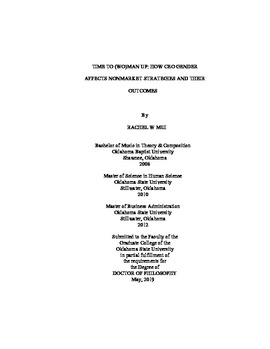| dc.contributor.advisor | Hill, Aaron D. | |
| dc.contributor.author | Mui, Rachel W. | |
| dc.date.accessioned | 2019-10-25T19:51:39Z | |
| dc.date.available | 2019-10-25T19:51:39Z | |
| dc.date.issued | 2019-05-01 | |
| dc.identifier.uri | https://hdl.handle.net/11244/321560 | |
| dc.description.abstract | In this dissertation, I aim to extend understanding on: a). how gender affects executive decision-making; and b). how gender-stereotypical actions can lessen two forms of realized biases (negative evaluations and social closure) that female chief executive officers (CEO) face. Utilizing upper echelons theory and gender role theory, I first investigate the antecedents of a CEO's engagement in two primary types of nonmarket actions, corporate social responsibility (CSR) and corporate political activity (CPA). I propose that both CSR and CPA can be descriptively classified according to gender stereotypical traits. In particular, I argue that because CSR is communal in nature, charitable, and socially oriented, the descriptive stereotype of women suggests that female CEOs will engage in more responsible CSR activities which are beneficial for society and fewer irresponsible CSR activities which pose possible harms. As such, female CEOs will also have a higher overall CSR rating. I further argue that because CSR conforms to the prescribed female stereotype, the relationship between CSR and market reactions will be more strongly related for female CEOs. On the other hand, I argue that female CEOs are both prevented and discouraged from engaging in CPA. In particular, I argue that female CEOs face a second type of bias in the form of social closure which creates "glass walls" that hinder them from successfully breaking into certain high-profile networks. I test this in the context of the male-dominated, "old boys' club" of politics. This "glass wall" form of social closure prevents female CEOs from establishing favorable, external political connections and accessing political-enhancing resources. As a result, social closure affects female CEOs' engagement in political activity. Because these "glass walls" within political networks create both unintentional and intentional biases against women, the benefits returned from engaging in political activity will likewise be lower for firms with female CEOs. This dissertation aims to make several important contributions to the upper echelons and gender-role literatures, as well as provide important managerial and practice implications for contemporary female CEOs. | |
| dc.format | application/pdf | |
| dc.language | en_US | |
| dc.rights | Copyright is held by the author who has granted the Oklahoma State University Library the non-exclusive right to share this material in its institutional repository. Contact Digital Library Services at lib-dls@okstate.edu or 405-744-9161 for the permission policy on the use, reproduction or distribution of this material. | |
| dc.title | Time to (Wo)man Up: How CEO Gender Affects Nonmarket Strategies and Their Outcomes | |
| dc.contributor.committeeMember | Pappas, James | |
| dc.contributor.committeeMember | Smith, Alexis | |
| dc.contributor.committeeMember | Parker, Owen | |
| dc.contributor.committeeMember | Watters, Craig | |
| osu.filename | Mui_okstate_0664D_16208.pdf | |
| osu.accesstype | Open Access | |
| dc.type.genre | Dissertation | |
| dc.type.material | Text | |
| dc.subject.keywords | corporate political activity | |
| dc.subject.keywords | corporate social responsibility | |
| dc.subject.keywords | gender role theory | |
| dc.subject.keywords | upper echelons theory | |
| thesis.degree.discipline | Business Administration | |
| thesis.degree.grantor | Oklahoma State University | |
